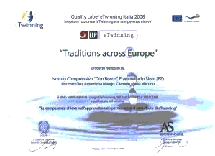There are things in life that one cannot control, anticipate or otherwise avoid. Death is one of those things. Last week, here in my site village of Brusturoasa, Romania, I was asked to document the funeral days of my gazda (host family) grandfather. He left this earth at age 94, no small feat, considering that life in the countryside is not always the easiest of days. He had a sense of humor, a large family, and judging by the turnout at the biserica (church), a very good amount of friends. We should all be so fortunate.
Only a few months ago, I had to endure the loss of my best friend to cancer. He was 62 and like a brother to me. Not having had the opportunity to say goodbye in the proper fashion of grieving that I would have liked, since I was now overseas and in the Peace Corps, this was somewhat of a blessing for me as I could focus instead on how the people around me were experiencing something so the same, but in a different way.
In the Orthodox faith, the deceased must lie in rest in his or her home for three days until the burial. In the room where they once slept, there is a glass of wine and a piece of bread set out for their repast. Many people come and go and all the while reflect upon the passing, most probably their own lives, and the time that they spent with the person now gone from them. Here, with strabunic (great-grandpa), there were many people who had either worked for him or been close to him for many years. His family, including those who could not be here as they work in other countries, sent large arrangements of flowers for the final day of wake. I, too, had a part in this on behalf of the Peace Corps and my days with him. He rested outside his old room with two candles at his feet and at his head, perpetually lit all day and night as he looked so peaceful in his best suit and favorite hat. He was covered by a lace and red rose overlay and a large, wooden cross, painted with his name, waited nearby to accompany him home.
There was sadness, surely, and there were tears, definitely, but there was also joy and laughter. As the women of the neighborhood made sarmale (stuffed cabbage with ground meat), fried chicken, pickled salads, and breads for the Sunday burial, they talked about life, love, giving, sharing, and losing, certainly not without a bit of gossip and a bit of melancholy…that is what we expect of ourselves. They cooked all day and the next day, too, as visitors came and went, having a glass of wine and a sweet cookie as they met each other, said goodbye to their loved one and then left on their way. It is custom that anyone who had lived in the same home not cook any of the food. And so, I watched, taking photos and video, keeping the children amused, and thinking about how much this was such a generous place with people who had seemingly simple surroundings with complex belief systems and a deeply ancient faith.
One of the Orthodox rituals unique to this region of the Eastern Carpathians which was quite interesting to me was to tie in a towel or cloth a bit of paper money with a string to hang on the flower offerings. There were also bundles of blankets tied with the same gifts, and two staffs and two lanterns to be carried along the processional route. A beautifully fresh fir tree litter was fashioned by the men of the family who tied black ribbons on the tree tops the morning before the last day. The women also made crosses out of fresh fruit skewered on sticks. Everyone was getting ready to send off the man who had waited all of fifty years to have in the words of his daughter, “the Americans come.” That was me, the lone US born volunteer who came upon his household to sit at the same table, watch the same television, and speak in some sort of unrecognizable language with some very early-and full of error-Romanian thrown in. But he always smiled at me and always tried to make conversation about what was going on in my day, in his house, within his world…I do imagine. He was very weak, but very alert, right up until the last day I saw him.
Now, as the funeral was in its last stages, the food prepared, the au revoirs made, the family readied, the snow fell outside and the air warmed. On Sunday morning, the preoti (clergymen) came to chant and pray over his soul as all bowed their heads. Strabunic was carried out into the snowy day, along the path outside his house and as he crossed the threshold for the last time, a live chicken was passed underneath him to give him health in the next life.
We all walked along the road, slippery as it was, but as the sun peaked through the clouds and the people talked softly all the way to the center of the village as six men carried his natural bed. Along the way, we stopped several times to have the preoti (clergymen) say a few words as is custom, and then as we continued along, more singing. At the church there were more candles, family and friends cried, and at his head was a grand table of bread, wine, and the special cake made of grain called coleve which we would all share at gravesite later. The offerings would continue, as I found out, for the next forty days each weekend on Sunday, and the first would be the ninth day of his death. The pamante, as it is called, is an offering of sustenance and remembrance. A round braid of sweetened and egg-washed yeast bread holds a candle on the table at funeral meals as well. And we did have a grand meal following the service.
But first, we all went to the back of the church to follow the casket to the place that would be his eternal rest. Everyone waited as the preot (clergyman) said his words and the men who had carried him lowered his body into the ground with ropes after having nailed shut the coffin to seal him for the last time into the next world. A strange kind of sound, but in a way, somewhat comforting as the rhythm evenly met with the quiet pauses of the winter day. A few spades of earth were thrown atop and the flowers given by all were left strewn about to grace his marker. We shared wine, bread and the coleve (traditional grain cake) there. I looked on, and the faces of the crowd as they dwindled were that of relief, peace, and understanding.
This is how I would imagine my friend. In a place where he would be always remembered, in a spiritual place with love and kindness, and in a place of abundance, without worries or pain, set in the gorgeous countryside, amid the towering mountains, glistening with snow, steeped in tradition, and shining inside with the brightness of the heavens from the love of his people around him.
Natalie Montanaro, M.Ed.
US Peace Corps
Brusturoasa, Romania











Recent Comments